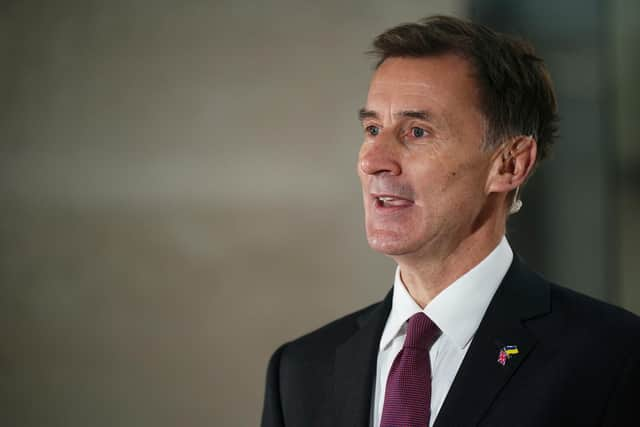Why the regulators should wield their power to protect consumers during cost of living crisis
The cost of living crisis is consumers’ number one concern at the moment. Rightly so. Whether it’s the price of food at the supermarket tills, monthly repayments on a mortgage or mid-contract hikes to broadband and mobile contracts, household budgets are being squeezed more than they have been for decades.
It was against that backdrop that key regulators responsible for competition and the energy, telecoms, financial services and water sectors met the Chancellor last week to agree an action plan to see consumers treated more fairly, and help those struggling with repayments.
Advertisement
Hide AdAdvertisement
Hide AdHigher interest rates have led to increased mortgage rates, with average fixed-rate two and five-year deals now both above 6 per cent. But higher interest rates haven’t been passed on to many savers, with several saving products with high street banks continuing to lag behind challengers when it comes to offering competitive rates. The FCA has committed to look into this.


A commitment from the Competition and Markets Authority (CMA) to speed up its grocery pricing review was welcome. Which? has been campaigning for supermarkets to do more to support customers amid higher food prices. That doesn’t mean price controls - and we realise a number of factors, some of which are beyond the control of supermarkets, contribute to the cost of items on the shelves.
But it does mean taking other measures that will help consumers, especially those from lower income households on smaller budgets. For example, the big supermarket groups own thousands of smaller convenience store branches, often located in low-income areas, where shoppers may not have easy transport or much choice about where to shop. But Which? research found these stores rarely, if ever, stock the cheapest budget range products. This needs to change - all supermarkets should ensure a range of healthy and affordable budget items is available in all stores, particularly in areas where people are really struggling.
Supermarkets should also commit to providing clearer and more transparent pricing. Unit pricing, which helps shoppers to compare products to see which offer the best value, is particularly important with products presented as deals or special offers. However, pricing information can be unclear. Indeed Tesco, the UK’s largest supermarket group, provides no unit pricing at all on its now ubiquitous Clubcard price offers - making it impossible for many people to work out whether they are really getting a good deal. Which? recently reported Tesco to the CMA, which is carrying out a review of unit pricing practices, as we believe it could potentially be breaching consumer law with this confusing pricing.
Advertisement
Hide AdAdvertisement
Hide AdWhether it’s our mobile phones or broadband, staying connected is a crucial part of everyday life. Yet due to annual price hikes to contracts each April, the consequence for consumers is either the acceptance of paying exorbitant fees to change providers and get out of the contract, or swallowing price hikes of as much as 17 per cent.
After last week’s meeting, the communications regulator Ofcom reiterated its commitment to publish its review into mid-contract prices by the end of the year to ensure customers are aware of what they’re signing up to. Unfortunately, the review will not be done in time to prevent these unacceptable bill hikes next year. Providers should take action ahead of the regulator’s review and stop these unfair price increases from happening next year.
Millions of consumers feel the brunt of these hikes, but as ever it’s those on the lowest incomes who take the hardest hit. Social tariffs have the potential to offer much needed respite in the form of less expensive broadband and phone packages. Our research has found that the average low-income customer affected by the price rise could save as much as £220.32 – £18.36 per month – by switching to a social tariff. Yet the awareness of them among low income consumers remains frustratingly low, with around half of them in the dark. Ofcom must make good on its commitment last week to work with industry to drive both knowledge and take up of social tariffs.
Regulators don’t have a magic wand that will make the cost of living crisis disappear. But they should proactively use their powers to make sure markets are working properly and deliver better outcomes for consumers.